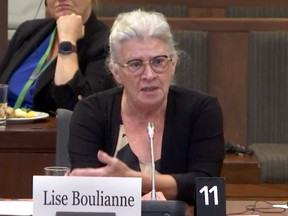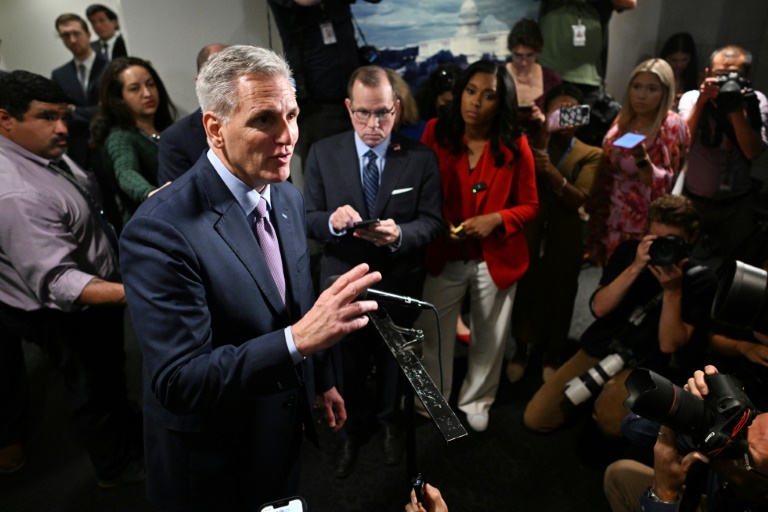‘I don’t see how a municipality could survive when 600 citizens are out of work. I can’t imagine that,’ Lise Boulianne said
Article content
OTTAWA – The mayor of Sacré-Coeur, a small village of 1,700 people in northern Quebec, says her municipality would empty out and could become a “ghost town” if federal Environment Minister Steven Guilbeault were to pass his decree to save the woodland caribou in Quebec.
Before the Standing Committee on Environment and Sustainable Development, Mayor Lise Boulianne called on the minister to change his mind and abandon the decree.
Advertisement 2
Article content
Sacré-Coeur is located on the Côte-Nord, almost 500 kilometres from Montreal. The main employer, forestry company Boisaco Inc., employs 600 citizens and both its president and general manager said that the decree would kill those jobs.
“I don’t see how a municipality could survive when 600 citizens are out of work. I can’t imagine that,” Boulianne said in an interview after speaking to the committee.
In June, Minister Guilbeault used his federal powers to issue an emergency order to protect woodland caribou habitat in Quebec and prohibit activities that contribute to “imminent threats.”
The decree, which is still at the consultation stage, would prohibit activities that contribute to imminent threats to the species. It could come into effect on September 15 if the Quebec government does not move on this issue.
“We are actively participating in the consultations. If the decree is adopted as it is presented, my municipality will no longer need a mayor,” Boulianne told the committee.
A few minutes later, Assembly of First Nations Quebec-Labrador Chief Ghislain Picard disputed the idea that the village would close, alluding to a disinformation campaign.
Article content
Advertisement 3
Article content
“At one time, there was a company called Kruger and communities that were told the same thing several years ago. These are communities that continue to vibrate and live today,” he said.
Recommended from Editorial
In a written statement, Guilbeault said it was his responsibility to protect the caribou.
“This measure is a last resort option due to Quebec’s inaction. Quebec can at any time present an appropriate plan that would allow the decree to be rejected,” he said. He did not comment on mayor Boulianne’s remarks.
The decree could force forestry companies to reforest abandoned roads in the Val-d’Or, Charlevoix and Pipmuacan regions. The order could also lead to a decline in forestry activity and significant job losses. Up to 2,000 jobs could be at stake, according to the industry.
“The decree will not be able to achieve the objectives for which it was created. It’s impossible. The main objective, which is to reduce the disturbance rate, we did our checks and it’s impossible given what is still permitted on the territory,” said Boisaco general manager, André Gilbert.
Advertisement 4
Article content
The company’s president, Steeve St-Gelais, said he was “worried” that the government would actually follow through with the decree.
“But we remain hopeful and we tell ourselves that common sense will eventually emerge,” he said in an interview with the National Post.
In 2023, the Quebec government estimated the caribou population to be between 6,162 and 7,445 individual animals. Ottawa maintains the majority of Quebec’s caribou populations are declining because of the loss or alteration of its habitat.
Woodland caribou has been designated a “vulnerable” species since 2005 in Quebec and a “threatened” species since 2003 in Canada. Quebec is home to approximately 15 per cent of Canada’s woodland caribou population.
Boisaco, however, disputes the notion that caribou are threatened in Quebec. It maintains that since 2013, the populations have been “stable.”
This provoked a strong reaction from Liberal MP Stéphane Lauzon, who challenged the witnesses to produce such proof.
“You say you have a document that says caribou are not threatened on your territory. I would like to have this document. I have never seen it,” said Lauzon.
Advertisement 5
Article content
The document in question was apparently produced by experts for the Quebec government.
“In other words, we cannot say that there has been a significant increase or decrease in the overall abundance of caribou in Quebec,” the document reads.
National Post
atrepanier@postmedia.com
Get more deep-dive National Post political coverage and analysis in your inbox with the Political Hack newsletter, where Ottawa bureau chief Stuart Thomson and political analyst Tasha Kheiriddin get at what’s really going on behind the scenes on Parliament Hill every Wednesday and Friday, exclusively for subscribers. Sign up here.
Our website is the place for the latest breaking news, exclusive scoops, longreads and provocative commentary. Please bookmark nationalpost.com and sign up for our newsletters here.
Article content








